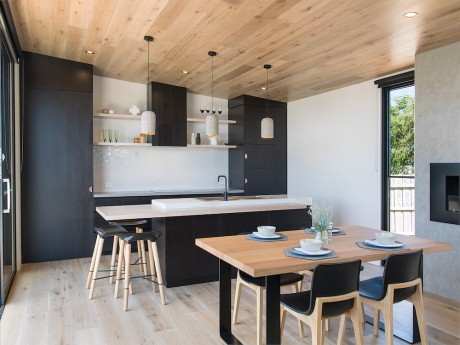If You’re Going to Covet, Covet This
The term “keeping up with the Joneses” is rarely framed in a positive manner. It refers to a nasty form of one upmanship, where someone is always trying to have the bigger car, bigger house, newer clothes, etc, than someone else (i.e. the Joneses). But as we saw last year, the Australian ‘edutainment’ project “The New Joneses” flips this formula on its head. Their logic is that if you’re going to compare yourself to people, you should compare it to the right people–those who are living in forward-thinking, intelligent, responsible ways. Starting today and through the month, TNJ is doing just that with an exhibition set up in downtown Melbourne, Australia.
The centerpiece of TNJ exhibition is a 720 sq ft home by Ecoliv Buildings, a company that specializes in producing high efficiency, prefabricated, modular homes. The house is fully off-grid capable, with a solar array by Q Cells and solar microinverter battery storage by Enphase, providing power when the sun’s not shining. There are a host of other green features to the home inlcuding a solar hot water, rainwater tanks, LED downlights, electricity use metering, a greywater recycling system, ceiling fans, double glazed windows and low VOC materials.
Since living sustainably means more than having a tricked out house, TNJ exhibition covers various aspects of daily living, both hi and low tech: from an electric BMW i3 and smart home tech to free roaming chickens and composting bins.
Throughout February, various people will be staying at the home as a proof of concept and way to spread the word. There will also be parties, movies and workshops as well (visit their website for more information).
Several years ago, Harvard released a study on obesity that was conducted on 12k people over the span of 32 years. They found that people were 57% more likely to become obese when a friend became obese. Was obesity “passed on” like a cold? Not exactly. It got passed along culturally. The study’s lead Dr. Christakis told the NY Times, how it highlights “the importance of a spreading process, a kind of social contagion, that spreads through the [social] network.” In other words, our environmental influences–the people we interact with, the messages we receive–have a huge impact on our behavior for better or worse. If our friends exercise regularly or buy a McMansion, the odds increase that we will do these things as well. TNJ seems to get this, showing that if we are to create new paradigms for living, ones that ‘live it up, with less’ as they say, we need to saturate our environment with good examples of how to do it. Check it out yourself online or if you’re in Melbourne in person.






